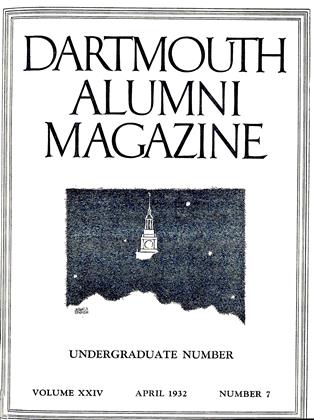ON SKYROS, island in the Aegean, the bones of Rupert Brooke lie under a marble slab. Those of his friends who were not killed in the World War are residing still in England. His books, next to friends and his own supple strength the most precious thing in life to him, have come over from Cambridge to take up their abode in Dartmouth College.
They are a brave company when placed together on the shelf, these comrades of ink and paper,—Marlowe, Ben Jonson, Shakespeare; yet taken separately they inspire pity, cause one to reflect on imagined associations. For along the margins run the pencilled thoughts of "the young Apollo, golden-haired," who died suddenly during the World War after having written some of the finest lyric poetry of our time.
Rupert was the second of three sons born to William Parker Brooke, a master at Rugby School in England. As a boy he played strenuously, and read widely and with keen delight; he was said to have been seen "always with a ball in his hand and a book in his pocket." While still at school he composed a great deal of verse, little of which was worth preserving. It was not until after he had gone up to Cambridge that be began to think and truly to express himself. The years at Cambridge were made delightful by long evenings spent in excited talk, excursions into Elizabethan literature, active participation in the Fabian Societies which held so important a place in the undergraduate life of that time. On one of his long vacations abroad he composed that most beautiful and melancholy of his poems, "The Old Vicarage, Grantchester." It is dated May, 1912, Cafe des Westens, Berlin.
Soon followed for Brooke a place in the Fellowship of Dons, then a protracted journey through North America and the islands of the South Seas. In Canada he writes: "Every now and then one comes up and presses my hand, and says, 'Wal, sir, you cannot know what a memorable day in my life this is.' Then I do my pet boyish-modesty act, and go pink all over. . . . One man said to me, 'Mr. Brooke, sir, I may tell you that in my opinion you have Mr. Noyes skinned.' " From New York comes this observation: "The American by race walks better than we; more freely, and with a taking swing, and almost with grace. How much of this is due to living in a democracy, and how much to wearing no braces, is difficult to determine." Samoa intoxicates him: "There it wonderfully is; heaven on earth, the ideal life, little work, dancing and singing and eating; naked people of incredible loveliness, perfect manners, and immense kindliness."
However, the cloud of war was to hang its menace above Europe, and Brooke was to return. Early in September of 1914 he was offered a commission in the Royal Navy Division, went with them to Antwerp, whence the division returned sadly reduced in numbers. On February 28 they sailed for the Dardanelles, where Brooke suffered acute blood poisoning; on the 25th of April he died.
It has been said that Rupert Brooke was not a great poet. If the volume of work produced is the criterion of literary stature, then he was not great. It is enough that he was a poet, the author of "Grantchester" and the "1914" sonnets. That his bones lie under the olive trees of Skyros could not be helped. Brooke wrote with such intensity about chivalry and valour because he saw only the beginning of the war; he sang most sweetly of England when far from her shore. Perhaps it is best that he now lies where he is. In England souls crowd thickly upon one another, and every foot of the ground conceals its "dust whom England bore, shaped, made aware." In the hills of New Hampshire the nights are long, and the wind cold, and men carry stamped on their faces a little of the great loneliness about them. But in Hanover there is youth and laughter and, for some part of the year, a love of poetry, a handful of lads to treasure the books he owned and watch over his lean but lovely heritage of song.
First -printed in THE DARTMOUTH, October 13, 1931, inconjunction with the announcement of the Private Libraryof Rupert Brooke having been acquired by the BakerMemorial Library.
 View Full Issue
View Full Issue
More From This Issue
-
 Article
ArticleAn Undergraduate Looks at His College
April 1932 By Howland H. Sargeant '32 -
 Article
Article"Wildcatter"—A Play in One Act
April 1932 By James W. Riley '32 -
 Class Notes
Class NotesCLASS OF 1910
April 1932 By Harold P. Hinman -
 Class Notes
Class NotesCLASS OF 1928
April 1932 By Leroy C. Milliken -
 Class Notes
Class NotesCLASS OF 1926
April 1932 By J. Branton Wallace -
 Article
ArticleThe Value of Fraternities to the College
April 1932 By Robert Coltman '32








